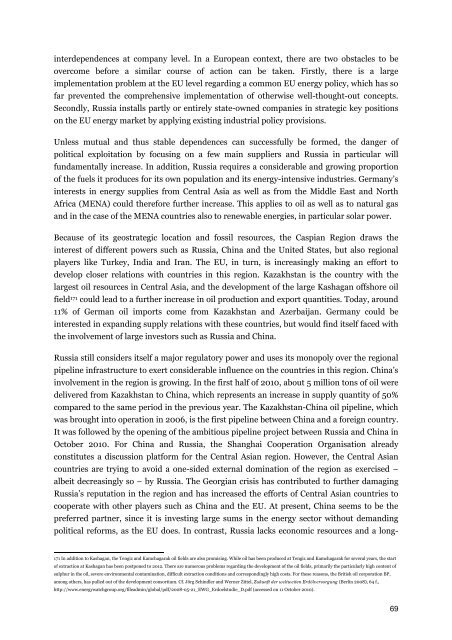PEAK OIL
PEAK OIL
PEAK OIL
Create successful ePaper yourself
Turn your PDF publications into a flip-book with our unique Google optimized e-Paper software.
interdependences at company level. In a European context, there are two obstacles to be<br />
overcome before a similar course of action can be taken. Firstly, there is a large<br />
implementation problem at the EU level regarding a common EU energy policy, which has so<br />
far prevented the comprehensive implementation of otherwise well-thought-out concepts.<br />
Secondly, Russia installs partly or entirely state-owned companies in strategic key positions<br />
on the EU energy market by applying existing industrial policy provisions.<br />
Unless mutual and thus stable dependences can successfully be formed, the danger of<br />
political exploitation by focusing on a few main suppliers and Russia in particular will<br />
fundamentally increase. In addition, Russia requires a considerable and growing proportion<br />
of the fuels it produces for its own population and its energy-intensive industries. Germany’s<br />
interests in energy supplies from Central Asia as well as from the Middle East and North<br />
Africa (MENA) could therefore further increase. This applies to oil as well as to natural gas<br />
and in the case of the MENA countries also to renewable energies, in particular solar power.<br />
Because of its geostrategic location and fossil resources, the Caspian Region draws the<br />
interest of different powers such as Russia, China and the United States, but also regional<br />
players like Turkey, India and Iran. The EU, in turn, is increasingly making an effort to<br />
develop closer relations with countries in this region. Kazakhstan is the country with the<br />
largest oil resources in Central Asia, and the development of the large Kashagan offshore oil<br />
field171 could lead to a further increase in oil production and export quantities. Today, around<br />
11% of German oil imports come from Kazakhstan and Azerbaijan. Germany could be<br />
interested in expanding supply relations with these countries, but would find itself faced with<br />
the involvement of large investors such as Russia and China.<br />
Russia still considers itself a major regulatory power and uses its monopoly over the regional<br />
pipeline infrastructure to exert considerable influence on the countries in this region. China’s<br />
involvement in the region is growing. In the first half of 2010, about 5 million tons of oil were<br />
delivered from Kazakhstan to China, which represents an increase in supply quantity of 50%<br />
compared to the same period in the previous year. The Kazakhstan-China oil pipeline, which<br />
was brought into operation in 2006, is the first pipeline between China and a foreign country.<br />
It was followed by the opening of the ambitious pipeline project between Russia and China in<br />
October 2010. For China and Russia, the Shanghai Cooperation Organisation already<br />
constitutes a discussion platform for the Central Asian region. However, the Central Asian<br />
countries are trying to avoid a one-sided external domination of the region as exercised –<br />
albeit decreasingly so – by Russia. The Georgian crisis has contributed to further damaging<br />
Russia’s reputation in the region and has increased the efforts of Central Asian countries to<br />
cooperate with other players such as China and the EU. At present, China seems to be the<br />
preferred partner, since it is investing large sums in the energy sector without demanding<br />
political reforms, as the EU does. In contrast, Russia lacks economic resources and a long-<br />
171 In addition to Kashagan, the Tengiz and Kamchagarak oil fields are also promising. While oil has been produced at Tengiz and Kamchagarak for several years, the start<br />
of extraction at Kashagan has been postponed to 2012. There are numerous problems regarding the development of the oil fields, primarily the particularly high content of<br />
sulphur in the oil, severe environmental contamination, difficult extraction conditions and correspondingly high costs. For these reasons, the British oil corporation BP,<br />
among others, has pulled out of the development consortium. Cf. Jörg Schindler and Werner Zittel, Zukunft der weltweiten Erdölversorgung (Berlin 2008), 64 f.,<br />
http://www.energywatchgroup.org/fileadmin/global/pdf/2008-05-21_EWG_Erdoelstudie_D.pdf (accessed on 11 October 2010).<br />
69


